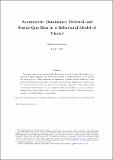Files in this item
Asymmetric dominance, deferral and status quo bias in a behavioral model of choice
Item metadata
| dc.contributor.author | Gerasimou, Georgios | |
| dc.date.accessioned | 2016-05-28T23:32:42Z | |
| dc.date.available | 2016-05-28T23:32:42Z | |
| dc.date.issued | 2016-02 | |
| dc.identifier | 233672510 | |
| dc.identifier | dc4c77ef-eb8e-40d7-a32f-1558b5eefa59 | |
| dc.identifier | 84956665300 | |
| dc.identifier | 000369017400007 | |
| dc.identifier.citation | Gerasimou , G 2016 , ' Asymmetric dominance, deferral and status quo bias in a behavioral model of choice ' , Theory and Decision , vol. 80 , no. 2 , pp. 295-312 . https://doi.org/10.1007/s11238-015-9499-7 | en |
| dc.identifier.issn | 0040-5833 | |
| dc.identifier.other | ORCID: /0000-0003-3712-3154/work/59698750 | |
| dc.identifier.uri | https://hdl.handle.net/10023/8895 | |
| dc.description.abstract | This paper proposes and axiomatically characterizes a model of choice that builds on the criterion of partial dominance and allows for two types of avoidant behavior: *choice deferral* and *status quo bias*. These phenomena are explained in a unified way that allows for a clear theoretical distinction between them to be made. The model also explains the *strengthening of the attraction effect* that has been observed when deferral is permissible. Unlike other models of status quo biased behavior, the one analyzed in this paper builds on a *unique*, reference-independent preference relation that is acyclic and generally incomplete. When this relation is complete, the model reduces to rational choice. | |
| dc.format.extent | 431612 | |
| dc.language.iso | eng | |
| dc.relation.ispartof | Theory and Decision | en |
| dc.subject | Partial dominance | en |
| dc.subject | Incomplete preferences | en |
| dc.subject | Choice deferral | en |
| dc.subject | Status quo bias | en |
| dc.subject | Attraction effect | en |
| dc.subject | HB Economic Theory | en |
| dc.subject | BDC | en |
| dc.subject.lcc | HB | en |
| dc.title | Asymmetric dominance, deferral and status quo bias in a behavioral model of choice | en |
| dc.type | Journal article | en |
| dc.contributor.institution | University of St Andrews. School of Economics and Finance | en |
| dc.identifier.doi | 10.1007/s11238-015-9499-7 | |
| dc.description.status | Peer reviewed | en |
| dc.date.embargoedUntil | 2017-02-01 |
This item appears in the following Collection(s)
Items in the St Andrews Research Repository are protected by copyright, with all rights reserved, unless otherwise indicated.

